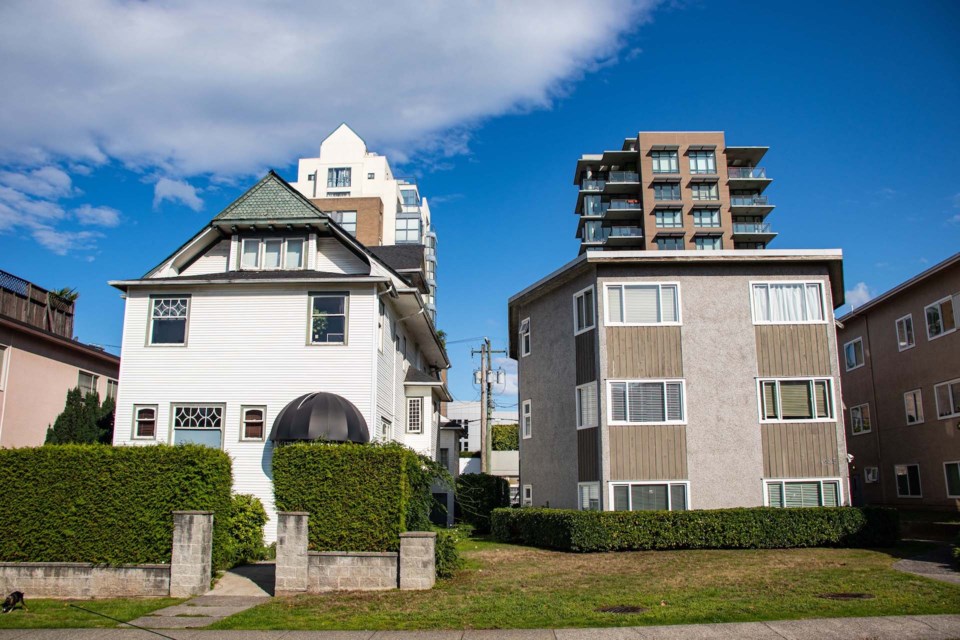A combination of factors is putting a financial squeeze on B.C. landlords who are seeing property insurance premiums skyrocket while their ability to raise rents is currently frozen and are capped at just a 1.4 per cent increase in 2021, under provincial rent control legislation.
“Insurance companies are putting the hammer down,” said Will Eddy, a client executive of Excel Insurance Brokers (Metro Vancouver) Inc. who explained Vancouver owners of older multi-family rental buildings are particularly at risk. “We are seeing increases of 40, 50, 100 per cent.”
Eddy said rising claims on the most expensive rental property in the country has caused a number of insurance companies to pull out of the B.C. market.
Vancouver’s rental universe is dominated by low-rise, wood-frame apartment buildings built more than 50 years ago. Yet, due to land values, the highest rents in the country and tight vacancy rates in the 1 per cent range, these old buildings can sell for $300,000 to more than $500,000 per suite.
In one July transaction, two adjacent older rental buildings in Kitsilano sold for $335,000 per suite, largely because of the land value.
Eddy said that landlords of older properties who cannot prove they have kept up with maintenance and upgrades, especially to electrical, plumbing, heating systems and roofs, are being shocked at the new insurance rates.
Rates for earthquake insurance, mandatory for most financing, “are through the roof,” he added.
“Some insurance companies have pulled out of B.C. completely,” Eddy said.
One Vancouver landlord, who asked not to be named, told Western Investor, “I’m seeing 50 per cent to 95 per cent increases on insurance policies that have renewed in the last 12 months. Further, while the annual premiums are jumping so much, so are the deductibles, such as damage due to flood. Some companies are no longer offering earthquake coverage.”
Mark Goodman, a multi-family specialist with Goodman Commercial Inc., in Vancouver, provided an insurance breakdown for an older Vancouver apartment building that had an insurance renewal in mid-September:
• The all risks deductible increased from $5,000 to $15,000.
• Sewer backup and water-damage deductibles increased from $10,000 to $50,000;
• The earthquake deductible increased from 10 per cent to a 20 per cent minimum, at $100,000;
• The flood deductible increased from $25,000 to $50,000;
• The lock and key deductible increased from $250 to $2,500; and
• The pollution liability deductible increased from $10,000 to $25,000.
Insurance coverage, in any case, may not be enough to replace a Vancouver building in the case of a disaster.
Insurance companies depend on industry evaluations, from firms such as Altus Group or Butterfield Development Consultants Ltd., for replacement costs, which are currently around $238 to $280 per square foot for a wood-frame apartment building in Vancouver.
Eddy conceded that, with Vancouver civic fees, modern green building standards, long approval delays, and costs increasing for labour and materials, this is often not a realistic figure for a building replacement.
Even landlords who have been rigorous with capital upgrades are facing much higher insurance rates, according to David Hutniak, president of LandlordBC.
“What we’re seeing is that ,even with robust risk management practices, the insurance premiums for purpose-built rental buildings are increasing substantially this year. [We have] concern about what the future holds as insurance markets tighten up,” Hutniak wrote in an email statement.
Hutniak said the insurance industry rate hikes parallel what is happening in B.C.’s strata market.
Cory Pettersen, president of Stratawest Management Ltd., and past president of Strata Property Agents of BC, said strata corporations experienced premium increases of between 40 per cent and 100 per cent this year, with very little warning.
On September 14, the B.C. government responded with tepid regulatory changes that will give stratas a heads-up on insurance hikes, but are not expected to lower costs.
LandlordBC called for provincial intervention for purpose-built rental building insurance in a submission to the Ministry of Finance this summer, but has not received a response.
While Metro Vancouver landlords are seeing the sharpest insurance hikes, rates are rising provincewide, noted James Blair, an agent with Marcus & Millichap who handles listings across B.C.
“A recent example was a building we just sold in Prince George. The premium went from about $12,000 annually to over $30,000,” Blair said.
Hutniak noted that B.C. landlords are being squeezed between costs and income. Rental increases have been frozen since March and the Residential Tenancy Act reduced the allowable rent increase for 2021 to 1.4per cent, down from 2.6 per cent this year.
“With increased insurance costs, property taxes, utility costs, COVID-19 related expenses, and the continual increase in all other operating and maintenance expenses, many rental housing providers will experience some real challenges the balance of this year and through 2021,” Hutniak stated.



